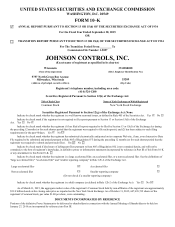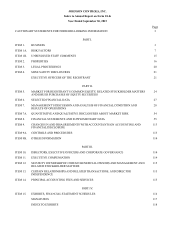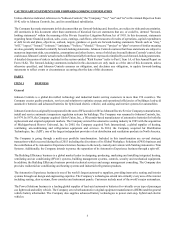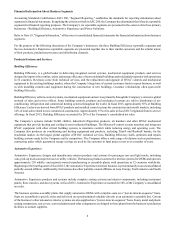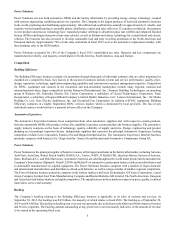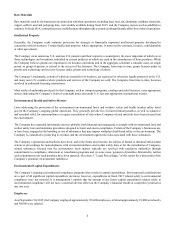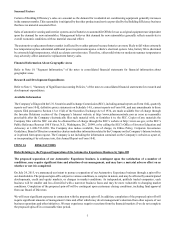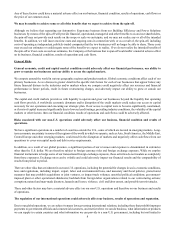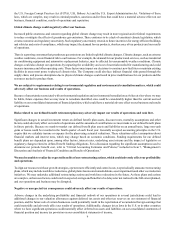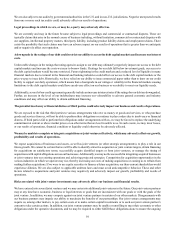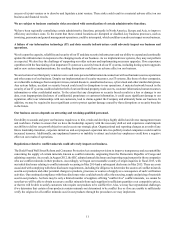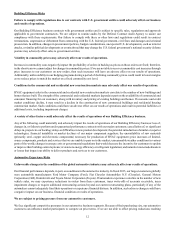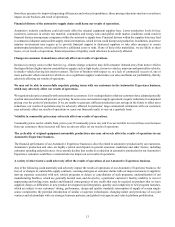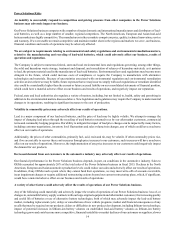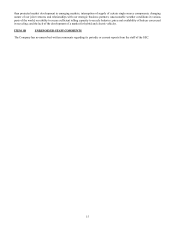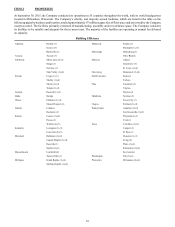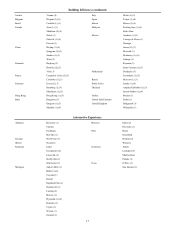Johnson Controls 2015 Annual Report Download - page 7
Download and view the complete annual report
Please find page 7 of the 2015 Johnson Controls annual report below. You can navigate through the pages in the report by either clicking on the pages listed below, or by using the keyword search tool below to find specific information within the annual report.
7
Seasonal Factors
Certain of Building Efficiency’s sales are seasonal as the demand for residential air conditioning equipment generally increases
in the summer months. This seasonality is mitigated by the other products and services provided by the Building Efficiency business
that have no material seasonal effect.
Sales of automotive seating and interior systems and of batteries to automobile OEMs for use as original equipment are dependent
upon the demand for new automobiles. Management believes that demand for new automobiles generally reflects sensitivity to
overall economic conditions with no material seasonal effect.
The automotive replacement battery market is affected by weather patterns because batteries are more likely to fail when extremely
low temperatures place substantial additional power requirements upon a vehicle’s electrical system. Also, battery life is shortened
by extremely high temperatures, which accelerate corrosion rates. Therefore, either mild winter or moderate summer temperatures
may adversely affect automotive replacement battery sales.
Financial Information About Geographic Areas
Refer to Note 19, "Segment Information," of the notes to consolidated financial statements for financial information about
geographic areas.
Research and Development Expenditures
Refer to Note 1, "Summary of Significant Accounting Policies," of the notes to consolidated financial statements for research and
development expenditures.
Available Information
The Company’s filings with the U.S. Securities and Exchange Commission (SEC), including annual reports on Form 10-K, quarterly
reports on Form 10-Q, definitive proxy statements on Schedule 14A, current reports on Form 8-K, and any amendments to those
reports filed pursuant to Section 13 or 15(d) of the Securities Exchange Act of 1934, are made available free of charge through
the Investor Relations section of the Company’s Internet website at http://www.johnsoncontrols.com as soon as reasonably
practicable after the Company electronically files such material with, or furnishes it to, the SEC. Copies of any materials the
Company files with the SEC can also be obtained free of charge through the SEC’s website at http://www.sec.gov, at the SEC’s
Public Reference Room at 100 F Street, N.E., Washington, D.C. 20549, or by calling the SEC’s Office of Investor Education and
Advocacy at 1-800-732-0330. The Company also makes available, free of charge, its Ethics Policy, Corporate Governance
Guidelines, Board of Directors committee charters and other information related to the Company on the Company’s Internet website
or in printed form upon request. The Company is not including the information contained on the Company’s website as a part of,
or incorporating it by reference into, this Annual Report on Form 10-K.
ITEM 1A RISK FACTORS
Risks Relating to the Proposed Separation of the Automotive Experience Business by Spin-Off
The proposed separation of our Automotive Experience business is contingent upon the satisfaction of a number of
conditions, may require significant time and attention of our management, and may have a material adverse effect on us
whether or not it is completed.
On July 24, 2015, we announced our intent to pursue a separation of our Automotive Experience business through a spin-off to
our shareholders. The proposed spin-off is subject to various conditions, is complex in nature, and may be affected by unanticipated
developments, credit and equity markets, or changes in market conditions. As independent, publicly traded companies, each
business will be smaller and less diversified with a narrower business focus and may be more vulnerable to changing market
conditions. Completion of the proposed spin-off will be contingent upon customary closing conditions, including final approval
from our Board of Directors.
We will incur significant expenses in connection with the proposed spin-off. In addition, completion of the proposed spin-off will
require significant amounts of management’s time and effort which may divert management’s attention from other aspects of our
business operations and other initiatives. We may experience negative reactions from the financial markets if we do not complete
the proposed spin-off in a reasonable time period.

